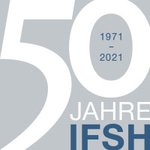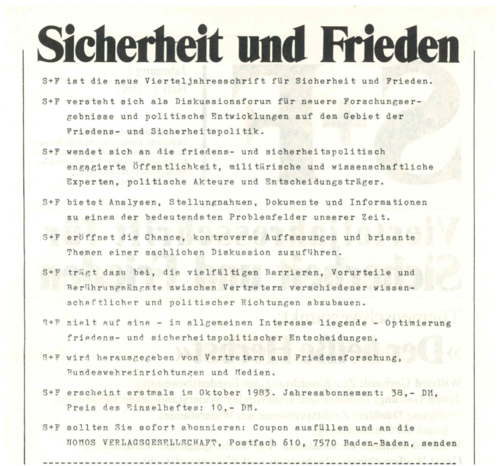38 years of contemporary history in the mirror of the magazine S+F
Development and Self-Perception
The genesis of the journal „S+F. Sicherheit und Frieden. Security and Peace“ is closely linked to the events of the time. The change of the editorial circles and the respective political challenges led to different concepts and focuses.
The then Deputy Director of IFSH, Dieter S. Lutz, founded the journal in cooperation with Nomos Publishing House in 1983. The basic idea of the publication was reflected in Lutz's entire life's work. He wanted to "make peace research findings politically viable." For him, peace research and classical security policy were two sides of the same coin, and could only be further developed together," as Ottfried Nassauer once pointedly summarized in his appreciation of Lutz's life's work.
The seemingly unbridgeable gap between peace research and security policy – between peace activists and security policy actors, between the military and civilians, between academics, the public and politicians – should be resolved constructively. This idea of enlightenment is clearly formulated in the journal's mission statement: Controversies should be conducted objectively, prejudices and fears of contact should be reduced, and the way should be paved for improved decision-making.
Much of the original "mission statement" is still true today: S+F is still a forum for the discussion of research results in the field of peace and security policy, addressing an engaged public, military and scientific experts and practitioners.
What at the time of its founding still appeared to be a daring balancing act and perhaps even utopian, established itself in the publication landscape within 38 volumes. To this day, there is no other journal with a comparable profile as a German specialist journal for peace research and security policy. S+F is a forum for communication and exchange between academia and politics, between civil society and the armed forces, in which there is room for analysis, insider reports, assessment and evaluation. Contributions were published that contributed to national and international discussions on security policy and peace research, on scientific aspects of arms control, and on questions of nationbuilding in post-war societies. Each issue of S+F is dedicated to a main topic. In addition, texts of general interest for security policy and peace research are published.
However, the various editors also use the focus topics for agenda setting. The authors come from different schools of thought, disciplines, institutions and fields of practice. They come from politics, the armed forces, international organizations, NGOs, think tanks or the media). The journal has given a voice to doctoral students, post-docs, professors and practitioners.
The first cover of S+F and its new design since 2004
Key themes
Contemporary history is also reflected in the topics covered by S+F. Sometimes the articles had their finger on the pulse of the times, sometimes they set forward-looking themes, such as in the discussion about the suspension of compulsory military service. This was first mentioned in one of our issues as early as 1995, until it was politically implemented in 2011. Other examples are the early take-up of topics such as cyber security / information warfare (2000).
Other thematic focal points illuminated the topic of "peace" from a wide variety of perspectives, for example from the point of view of the peace movement, peace research or peace education, etc. The development of the Bundeswehr was also critically accompanied with contributions on its various reforms and transformations and its missions abroad.
Other focal topics of the individual issues also included arms control, terrorism and debates on the conceptions of peace and security. In addition to domestic issues such as reunification or the demise of the Eastern bloc, the focus was also repeatedly on regions and organizations that were of particular relevance to the discourse in Europe: EU, OSCE, UN, NATO or Balkan wars, developments in Southeastern Europe, wars in Iraq and Afghanistan, Pacific, Asia, USA, Soviet Union/Russia, Middle East, Africa, Arctic up to topics such as democratization processes, climate change, geo-engineering, gender, migration, populism or the influence of new technologies.
Farewell
It is due to changes in the publishing landscape, the general death of journals in a highly competitive international market, and the shift to freely available digital formats that S+F has chosen to voluntarily leave well-positioned rather than being forced to do so at some point. To date, there is no comparable journal that fills this thematic gap and offers the same forum.
This article is an abridged and translated version of: Patricia Schneider (with the collaboration of Isabel Billmeier): Ein Blick von innen – die Entwicklung von S+F. In: S+F. Sicherheit und Frieden. Security and Peace, 38. Jg., 4/2020, p. 228-234.
You will find many free titles in our anniversary issue S+F 4/2020!
Open access are available:
Sicherheit und Frieden – Neubestimmung eines alten Verhältnisses
Sabine Jaberg
Graf Baudissins Konzept der Inneren Führung: notwendiger denn je!
Hans-Georg Ehrhart
Öffentlichkeit und Partizipation in der deutschen Außen- und Sicherheitspolitik
Anna Geis
Polarisierung oder Normalisierung? Die Politisierung der Sicherheit und ihre Folgen für demokratische Politik
Hendrik Hegemann
Democratising security in turbulent times: an infrastructural lens
Christine Hentschel und Ursula Schröder
Dilemmas of European Migration Policies: Failure of Sea Rescue in the Mediterranean or Successful Externalization of Borders?
Patricia Schneider





![[Translate to English:] Cover der Erstausgabe S+F](/file/_processed_/9/8/csm_Erstes-Cover_a591d0a9a7.png)
![[Translate to English:] Neues Cover-Design seit 2004](/file/_processed_/f/3/csm_Neueres-Cover_d4262e82a3.png)






